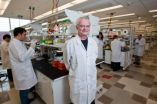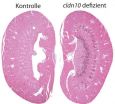(Press-News.org) Medical research saves lives, suffering and dollars – while also creating jobs and economic activity. The United States has long led the world, with hundreds of thousands of jobs and marketable discoveries generated by government research funding every year. Top students from around the world come here for training -- and often stay to help fuel medical innovation.
Now, warns a team of researchers in the New England Journal of Medicine, the U.S. risks losing out to Asia as the hub of medical discovery.
The result, they caution, could be a "brain drain" of top young researchers, and the loss of untold discoveries and economic activity. The authors are two physician researchers from the University of Michigan Medical School and VA Ann Arbor Healthcare System, and an American researcher who left the U.S. for better job prospects in Singapore.
They compiled data on five Asian countries – China, India, Singapore, South Korea and Taiwan – that are all boosting their government support for medical research right now. All five have a long-term plan for increased support for such research, as part of efforts to boost their national economies and world standing.
By contrast, American medical scientists and physician researchers face almost certain cuts to federal research funding.
At best, the authors say, funding for the National Institutes of Health – which supports most U.S. medical research – will fail to keep pace with inflation next year.
At worst, if the federal budget falls off the 'fiscal cliff' of automatic cuts, American medical research spending will fall by 8 percent, with thousands of researchers cut off from funding. One estimate says this could cost the U.S. $4.5 billion in economic activity. There are also proposals to cut entire health research agencies.
By contrast, China has increased spending on medical research by 67 percent, South Korea by 24 percent, India by 15 percent, Singapore by 12.5 percent and Taiwan by 4 percent in the most recent year for which data was available.
"In recent years, NIH funding has not kept pace with growth in biomedical innovation, making it harder for scientists to win grants," says first author Gordon Sun. M.D., an otolaryngologist and health researcher who is currently a 2011-2013 Robert Wood Johnson Foundation Clinical Scholar at U-M, supported by the U.S. Department of Veterans Affairs. "Meanwhile, these five Asian countries have pledged long-term increases in funding."
He notes that the number of clinical trials of new medical ideas in the U.S. has fallen, while the number in countries like China has grown.
Sun and his co-authors warn that this trend could lead to long-term economic damage for the United States and the loss of its stature as a global leader in the field. "Powerful incentives that can retain an elite biomedical research workforce are necessary to strengthen the U.S. health care system and economy," they write.
The stakes of this Asian rise and American decline are highest for current and future postdoctoral fellows – young researchers who have finished their M.D. or Ph.D. training and have decided to go into research as a career.
Post-doctoral training in a laboratory or health research specialty usually primes them for their first full-time research position – and their first grant applications as independent researchers. Winning grants year after year is vital to a research career – making sustained federal research support important.
But with grant dollars becoming harder to find in the U.S., and easier to obtain in Asia, young researchers may choose to take their very portable talents overseas.
In fact, China has started programs to attract young Chinese scientists back to China after training in the U.S.
And with English being the common language for researchers in India and Singapore, those nations may attract increasing numbers of American-born researchers – such as Jeffrey Steinberg, Ph.D., Sun's co-author and personal friend. He now works at the Singapore Bioimaging Consortium, supported by the nation's Agency for Science, Technology, and Research.
"In researching this article, we were surprised at how well-developed other countries' plans are for including medical research and scientific research as part of long-term goals," says Sun. "All of them have a fairly well-defined plan, which is part of their overall efforts to become economic powers. Whereas in the U.S., NIH funding is considered as just another part of the annual budget, and can be cut at any time."
The American approach to budgeting for medical research appears to ignore the long-term economic payoff of sustained research, says Sun. "Simply cutting research spending off will end a lot of projects immediately. Then, all these well-trained people – what are they going to do? Many will go somewhere where their work may be more appreciated."
###In addition to Sun and Steinberg, the Perspectives article was co-authored by Reshma Jagsi, M.D., D.Phil. (RWJF), an associate professor of radiation oncology at U-M and the Ann Arbor VA. She is a member of the Center for Bioethics and Social Sciences in Medicine, a joint program sponsored by the U-M Medical School and the Ann Arbor VA.
Reference: NEJM 367;8, August 23, 2012 DOI: 10.1056/NEJMicm1206643
US risks losing out to Asia in medical research, U-M team warns
Strong, sustained growth in research spending in Asian nations contrasts with US cuts and short-term approach – and a 'brain drain' could result
2012-08-23
ELSE PRESS RELEASES FROM THIS DATE:
Foreclosures impact California voter turnout
2012-08-23
RIVERSIDE, Calif. — California neighborhoods reeling from record foreclosures also experienced lower levels of voter turnout in the 2008 presidential election, according to researchers at the University of California, Riverside.
Voters who lost their homes were not the only ones who appear to have been affected, sociologist Vanesa Estrada-Correa and political scientist Martin Johnson determined in a study believed to be the first to assess the effect of foreclosure on political participation. Voters who remained in neighborhoods impacted by foreclosure were less likely ...
Underground solution to starving rice plants
2012-08-23
Scientists have pinpointed a gene that enables rice plants to produce around 20% more grain by increasing uptake of phosphorus, an important, but limited, plant nutrient.
The discovery unlocks the potential to improve the food security of rice farmers with the lowest value phosphorus-deficient land allowing them to grow more rice to add to global production, and earn more.
The gene – called PSTOL1 which stands for Phosphorus Starvation Tolerance – helps rice grow a larger, better root system and thereby access more phosphorus. Farmers can apply phosphorus fertilizers ...
The Milky Way now has a twin (or 2)
2012-08-23
Research presented today at the International Astronomical Union General Assembly in Beijing has found the first group of galaxies that is just like ours, a rare sight in the local Universe.
The Milky Way is a fairly typical galaxy on its own, but when paired with its close neighbours - the Magellanic Clouds - it is very rare, and could have been one of a kind, until a survey of our local Universe found another two examples just like us.
Astronomer Dr Aaron Robotham, jointly from the University of Western Australia node of the International Centre for Radio Astronomy ...
New insights into why humans are more susceptible to cancer and other diseases
2012-08-23
Chimpanzees rarely get cancer, or a variety of other diseases that commonly arise in humans, but their genomic DNA sequence is nearly identical to ours. So, what's their secret? Researchers reporting in the September issue of the American Journal of Human Genetics, a Cell Press journal, have found that differences in certain DNA modifications, called methylation, might play a role.
The researchers discovered hundreds of genes that display different patterns of methylation between the two species. These different patterns of methylation lead to different levels of expression, ...
'Naked Darth Vader' approach could tame antibiotic resistant superbugs
2012-08-23
Rather than trying to kill bacteria outright with drugs, Université de Montréal researchers have discovered a way to disarm bacteria that may allow the body's own defense mechanisms to destroy them. "To understand this strategy one could imagine harmful bacteria being like Darth Vader, and the anti-virulence drug would take away his armor and lightsaber," explained Dr. Christian Baron, the study's lead author and Professor at the Department of Biochemistry. "A naked Darth Vader would be an easy target and similarly, pathogenic bacteria without their virulence factors would ...
Histone-modifying proteins, not histones, remain associated with DNA through replication
2012-08-23
PHILADELPHIA—It's widely accepted that molecular mechanisms mediating epigenetics include DNA methylation and histone modifications, but a team from Thomas Jefferson University has evidence to the contrary regarding the role of histone modifications.
A study of Drosophila embryos from Jefferson's Department of Biochemistry and Molecular Biology published ahead of print in Cell August 23 found that parental methylated histones are not transferred to daughter DNA. Rather, after DNA replication, new nucleosomes are assembled from newly synthesized unmodified histones.
"Essentially, ...
Study reveals human drive for fair play
2012-08-23
People will reject an offer of water, even when they are severely thirsty, if they perceive the offer to be unfair, according to a new study funded by the Wellcome Trust. The findings have important implications for understanding how humans make decisions that must balance fairness and self-interest.
It's been known for some time that when humans bargain for money they have a tendency to reject unfair offers, preferring to let both parties walk away with nothing rather than accept a low offer in the knowledge that their counterpart is taking home more cash.
In contrast, ...
Therapeutic avenues for Parkinson's investigated at UH
2012-08-23
HOUSTON, Aug. 23, 2012 – Scientists at the University of Houston (UH) have discovered what may possibly be a key ingredient in the fight against Parkinson's disease.
Affecting more than 500,000 people in the U.S., Parkinson's disease is a degenerative disorder of the central nervous system marked by a loss of certain nerve cells in the brain, causing a lack of dopamine. These dopamine-producing neurons are in a section of the midbrain that regulates body control and movement. In a study recently published in the Proceedings of the National Academy of Sciences (PNAS), ...
Gene 'switch' may explain DiGeorge syndrome severity
2012-08-23
The discovery of a 'switch' that modifies a gene known to be essential for normal heart development could explain variations in the severity of birth defects in children with DiGeorge syndrome.
Researchers from the Walter and Eliza Hall Institute made the discovery while investigating foetal development in an animal model of DiGeorge syndrome. DiGeorge syndrome affects approximately one in 4000 babies.
Dr Anne Voss and Dr Tim Thomas led the study, with colleagues from the institute's Development and Cancer division, published today in the journal Developmental Cell.
Dr ...
New insights into salt transport in the kidney
2012-08-23
Sodium chloride, better known as salt, is vital for the organism, and the kidneys play a crucial role in the regulation of sodium balance. However, the underlying mechanisms of sodium balance are not yet completely understood. Researchers of the Max Delbrück Center for Molecular Medicine (MDC) Berlin-Buch, Charité – Universitätsmedizin Berlin and the University of Kiel have now deciphered the function of a gene in the kidney and have thus gained new insights into this complex regulation process (PNAS Early Edition, doi/10.1073/pnas.1203834109)*.
In humans, the kidneys ...
LAST 30 PRESS RELEASES:
Don’t Panic: ‘Humanity’s Last Exam’ has begun
A robust new telecom qubit in silicon
Vertebrate paleontology has a numbers problem. Computer vision can help
Reinforced enzyme expression drives high production of durable lactate-based polyester
In Rett syndrome, leaky brain blood vessels traced to microRNA
Scientists sharpen genetic maps to help pinpoint DNA changes that influence human health traits and disease risk
AI, monkey brains, and the virtue of small thinking
Firearm mortality and equitable access to trauma care in Chicago
Worldwide radiation dose in coronary artery disease diagnostic imaging
Heat and pregnancy
Superagers’ brains have a ‘resilience signature,’ and it’s all about neuron growth
New research sheds light on why eczema so often begins in childhood
Small models, big insights into vision
Finding new ways to kill bacteria
An endangered natural pharmacy hidden in coral reefs
The Frontiers of Knowledge Award goes to Charles Manski for incorporating uncertainty into economic research and its application to public policy analysis
Walter Koroshetz joins Dana Foundation as senior advisor
Next-generation CAR-T designs that could transform cancer treatment
As health care goes digital, patients are being left behind
A clinicopathologic analysis of 740 endometrial polyps: risk of premalignant changes and malignancy
Gibson Oncology, NIH to begin Phase 2 trials of LMP744 for treatment of first-time recurrent glioblastoma
Researchers develop a high-efficiency photocatalyst using iron instead of rare metals
Study finds no evidence of persistent tick-borne infection in people who link chronic illness to ticks
New system tracks blockchain money laundering faster and more accurately
In vitro antibacterial activity of crude extracts from Tithonia diversifolia (asteraceae) and Solanum torvum (solanaceae) against selected shigella species
Qiliang (Andy) Ding, PhD, named recipient of the 2026 ACMG Foundation Rising Scholar Trainee Award
Heat-free gas sensing: LED-driven electronic nose technology enhances multi-gas detection
Women more likely to choose wine from female winemakers
E-waste chemicals are appearing in dolphins and porpoises
Researchers warn: opioids aren’t effective for many acute pain conditions
[Press-News.org] US risks losing out to Asia in medical research, U-M team warnsStrong, sustained growth in research spending in Asian nations contrasts with US cuts and short-term approach – and a 'brain drain' could result


